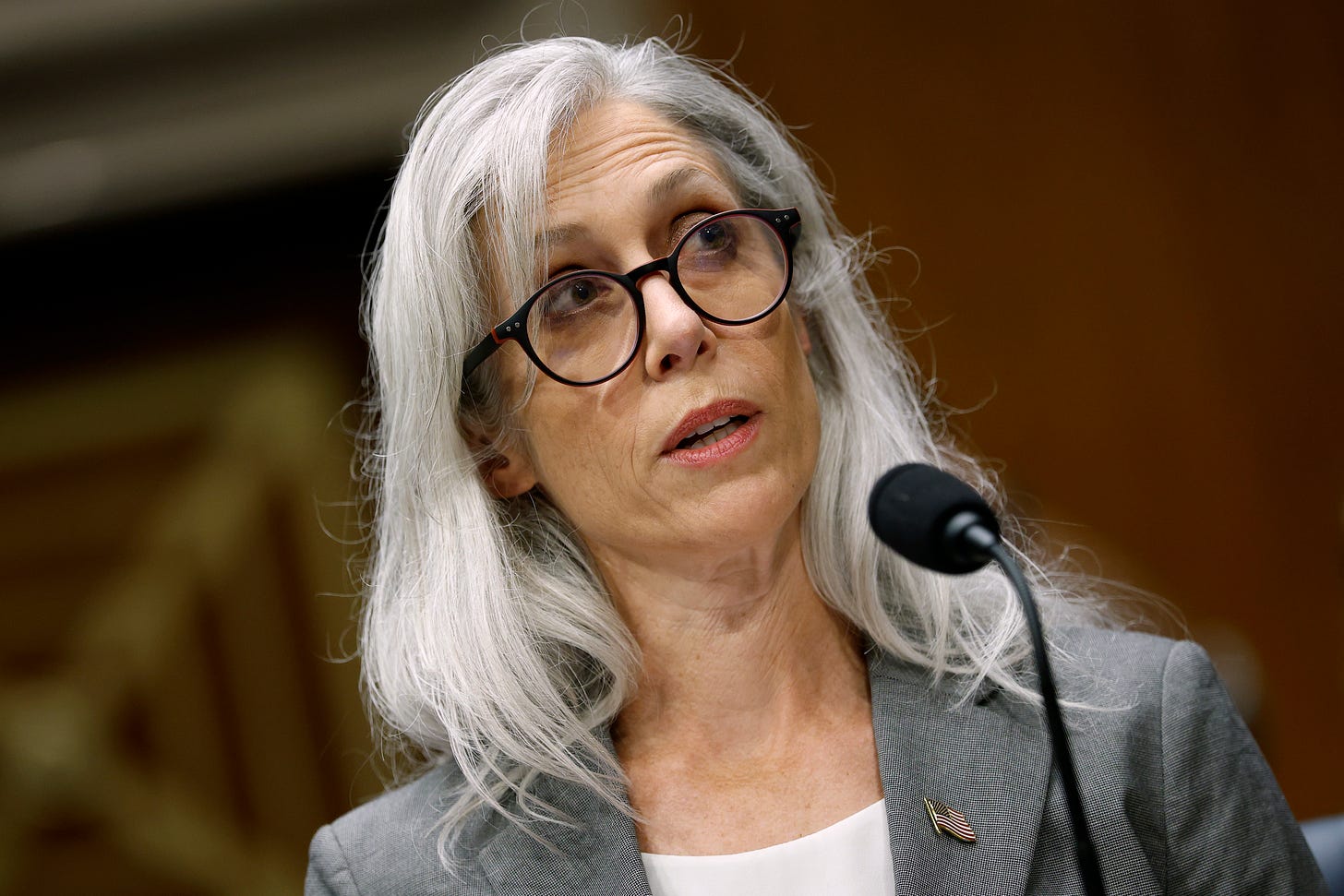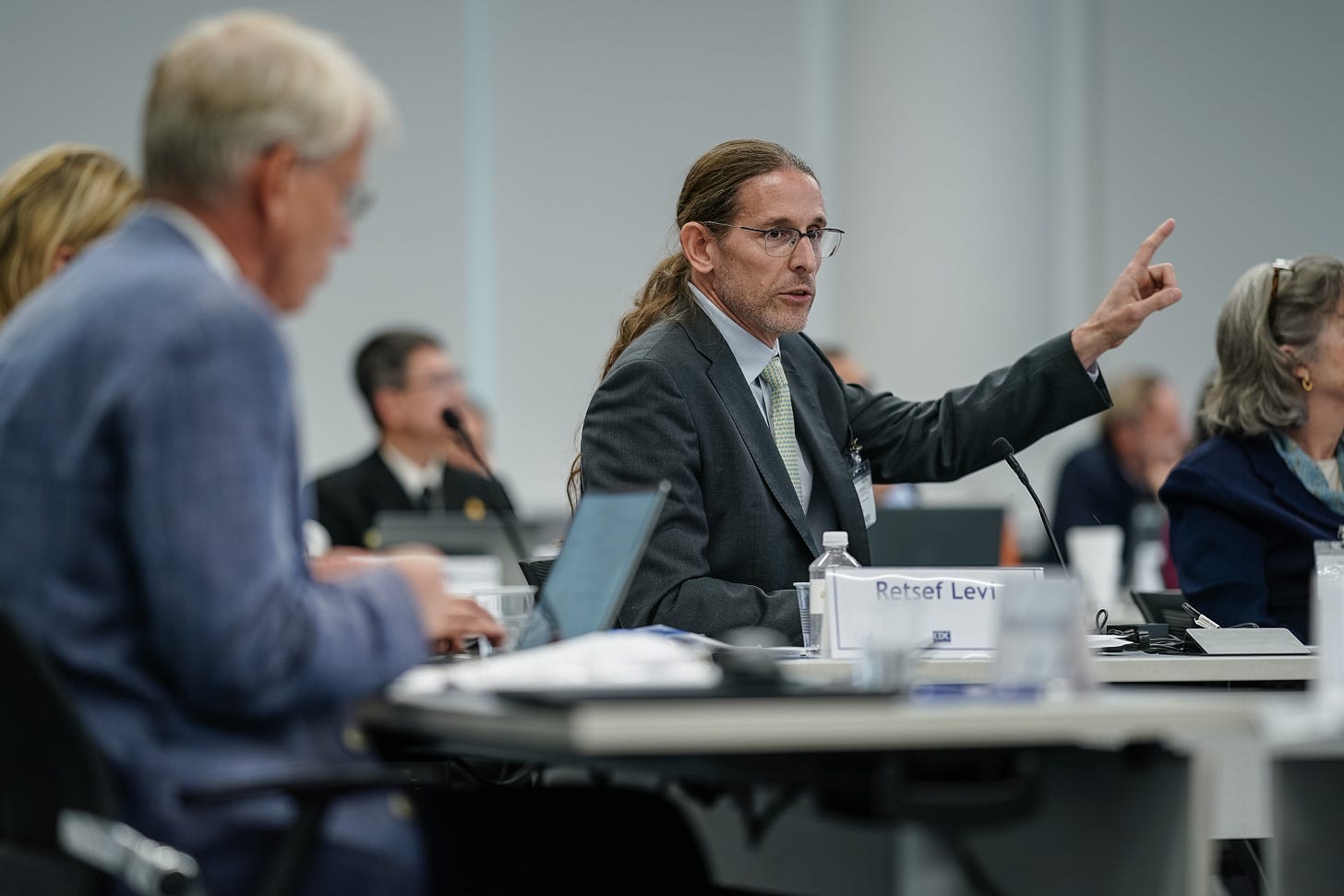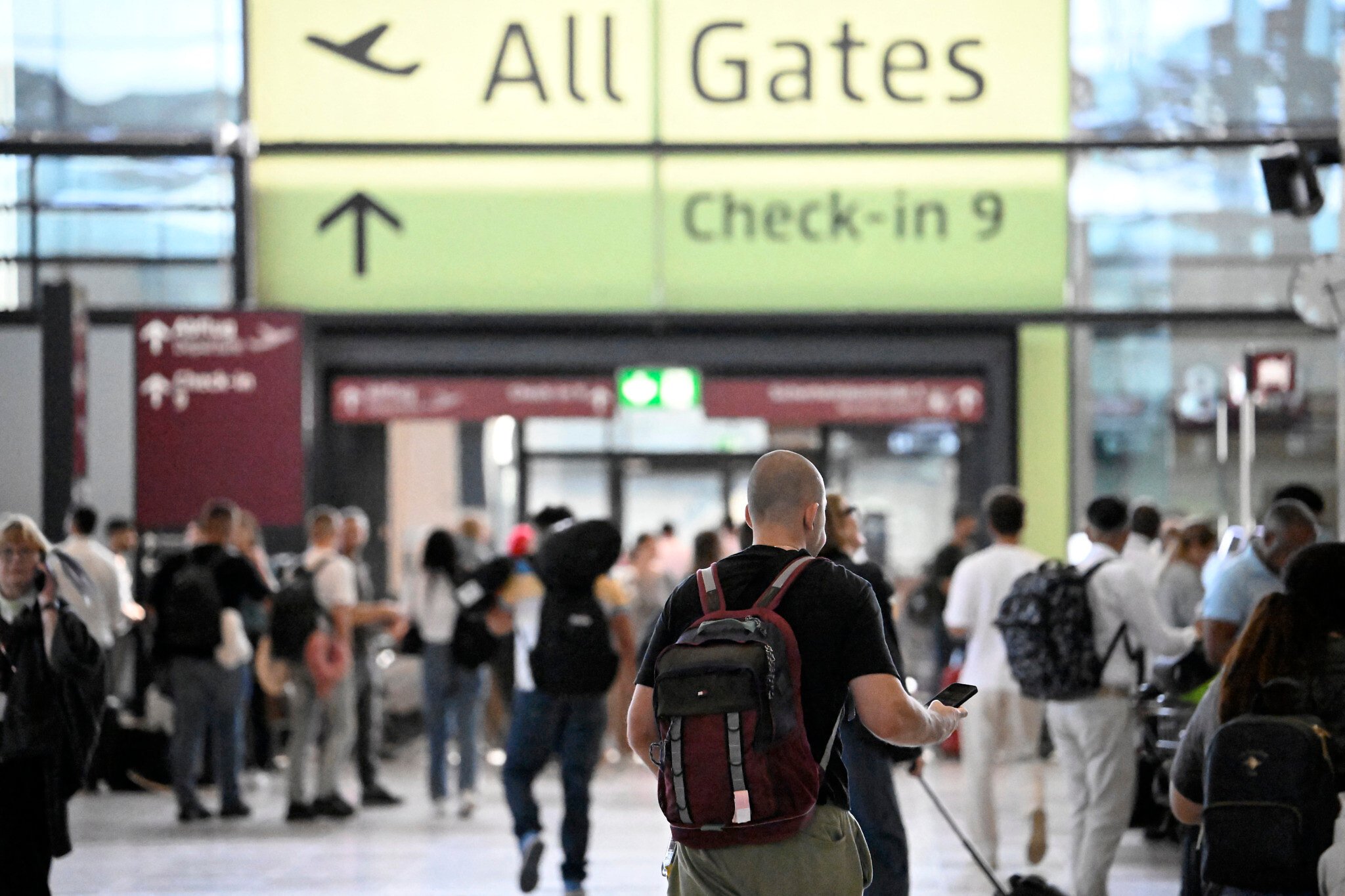
IF YOU WANT TO UNDERSTAND what Robert F. Kennedy Jr. is really doing as secretary of health and human services—and the danger to which he’s likely exposing the American public—look back at what happened over three remarkable days last week.
Start with Wednesday, when the Senate Health, Education, Labor and Pensions Committee heard testimony from Susan Monarez, the former CDC director whom Kennedy forced out of her job just weeks after she had started. It was Monarez’s first public appearance since the firing, and she had a lot to say.
Along with Debra Houry, a veteran physician and administrator who resigned as CDC medical director in protest of Kennedy’s policies, Monarez described the ways she said Kennedy was sidelining or firing anybody who might object to his widely discredited ideas about vaccination. That included, she said, the time Kennedy demanded she preemptively endorse changes in vaccine recommendations for children—a demand she says she refused.
“I was fired for holding the line on scientific integrity,” Monarez said.
That was just a warmup for Thursday and Friday, when the CDC’s official advisory committee on immunization met to consider some of those aforementioned vaccine-recommendation changes. The committee was full of Kennedy appointees he’d put there after firing the scientists who had been on the panel before. And the proceedings unfolded about how you’d expect, with familiar, scientifically questionable assertions about alleged vaccine harms.
But the meeting also stood out for its disarray. One particularly memorable sequence started at the end of Thursday’s session, when the panel prepared to vote on a resolution that would affect availability of the MMRV shot, which combines immunization for varicella (chickenpox) with immunization for measles, mumps, and rubella.
The resolution’s wording and meaning were unclear, as one panelist protested openly. The panel approved it anyway, only to hold a new vote—and reverse the decision—at the start of Friday’s session, evidently because several other panelists had also been confused.
“We are rookies,” chairman Martin Kulldorff acknowledged in his opening remarks Friday—which perhaps understated things, given that five of the twelve members hadn’t even been named until four days before.
The upshot of that MMRV debate is that few children are likely to get the combined shot anymore. And while that’s not earth-shattering, because most kids already get two separate shots anyway, the decision along with the rest of the week’s developments were the clearest sign yet of Kennedy’s true intentions. Although he insists he is not anti-vax—that he simply wants to promote choice, and to uphold “gold-standard science”—he keeps finding ways to make vaccines less accessible and, in so doing, to reduce vaccination rates overall.
But last week showcased another, equally important side of Kennedy’s management: the way he is eliminating the people and dispensing with the procedures that allow agencies like the CDC to carry out their basic functions in a transparent, scientifically sound way. The effect isn’t so much to realign priorities as it is to unleash chaos. But that can still be corrosive to the government’s credibility—and hazardous to the people who depend on it.
STRICTLY SPEAKING, little of what Monarez said on Wednesday was new. The basic outlines of her saga as she remembers it—that she’d refused to fall in line with Kennedy’s vaccine directives and refused to fire career scientists like Houry—were already out there, thanks to news reporting and a short opinion piece Monarez had written for the Wall Street Journal a week before.
But the versions of the stories that Monarez and Houry told over the course of their nearly three-hour testimony were more detailed and vivid. Together, they painted a picture of a temperamental, controlling, and downright ignorant cabinet secretary that at any other time—and in any other administration—would have created a political firestorm.
During the Texas measles outbreak, Monarez said, neither she nor any of the career CDC scientists briefed Kennedy—something highly unusual for any outbreak, let alone one that had resulted in the first child measles deaths in decades. But the outbreak still kept her busy, in part because Kennedy was putting out so many false statements about vaccines.
“He said things like ‘vaccines had fetal parts,’” Monarez said, “and I had to send a note to our leadership team to correct that misinformation.”
Fealty to Kennedy was also an issue: Monarez said that she was instructed to communicate about sensitive matters only with his political appointees, not career officials. In addition, she said, she was admonished not to communicate directly with members of the Senate HELP committee, who have oversight responsibility over the CDC and to whom she’d gone with some of her concerns about Kennedy’s decision-making.
The most difficult moments, Monarez said, were when Kennedy disparaged CDC staff: “He called . . . CDC the most corrupt federal agency in the world, emphasized that CDC employees were horrible people. . . . He said that CDC employees were killing children and they don’t care.”
All of that was a prelude to Monarez’s confrontation with Kennedy over changes to children’s vaccine recommendations, which he said would be coming in September. In her recollection, Kennedy wanted a promise that she’d endorse whatever the advisory committee recommended—a promise that she felt would violate her duty to evaluate such recommendations on the merits, and that she says she would not make.
“He was very upset,” Monarez said. “The entire meeting was very tense. He was very upset throughout the entirety of our discussion, and it was not a productive exchange of information.”
Monarez was composed throughout the hearing, even as GOP senators tried to paint her as a partisan operative out to make Donald Trump look bad. (Mind you, these senators were part of the unanimous Republican vote to confirm Monarez two months earlier after her nomination by Trump.) At one point, Oklahoma Republican Senator Markwayne Mullin even said he had a recording that showed Monarez was lying about a key conversation she’d had with Kennedy.
She stood her ground, and Mullin later withdrew the allegation.
That doesn’t mean everything she and Houry said happened exactly as they recounted it. Even the most honorable witnesses can misremember things. But the stories they told about Kennedy line up well with his public record of downplaying the Texas outbreak, spreading false information about vaccines, and attacking the CDC—not to mention the agitated, angry persona that was on display when he testified before another Senate committee two weeks ago.
And if that evidence alone doesn’t back up Monarez’s version of events, what unfolded in the advisory meetings Thursday and Friday sure did.
MEETINGS OF THE Advisory Committee on Immunization Practices (that’s the official title) are typically sleepy, technical affairs, and pretty well orchestrated too. That’s not to say outcomes are preordained, or that they can’t be contentious. But the tone and pace is typically more academic than antagonistic. Following procedural rules is a priority.
It’s difficult to capture all the ways in which last week’s meeting deviated from those norms, because it was so full of bizarre moments—like the time on Friday morning when an open mic caught somebody saying “you’re an idiot” while committee member and MIT professor Retsef Levi was speaking.

But decorum wasn’t the meeting’s only casualty. Intellectual integrity took a blow too. The committee’s usual process for taking up a new proposal is to announce that it will be on the agenda weeks, if not months, before a meeting—and then assign working groups, staffed by CDC scientists, who can carefully study the available research before making presentations to the full committee.
Frequently presentations won’t even lead to immediate votes, with the committee instead deciding to continue deliberating—and, perhaps, getting more input from the working groups. The process is methodical by design, because the idea is to make sure the committee members are working from research that has gone through a rigorous review, from analysts with deep expertise—and that they’ll have enough time to thoroughly understand the science and the stakes, and to think through changes before making them.
Last week’s meeting didn’t work like that at all. Scientists from the agency’s vaccine center “were completely shut out” of the preparations, according to STAT News. The resolutions up for debate were not posted in advance of the meeting, nor were presentations that—as observers of the proceedings noted—included papers that had not gone through peer review, and leaned on unproven claims.
The result was a series of unsubstantiated, ill-informed statements—like the time one panelist asked about adjuvants in a vaccine that doesn’t contain them, or moments when panelists seemed not to understand their authority—that had prominent experts from around the country aghast. Among them was Stanley Plotkin, who developed the rubella vaccine in the 1960s and is the author of the field’s standard textbook, Plotkin’s Vaccines. After watching the proceedings, he wrote an email to Levi stating, “Please consider whether your grasp of immunology and public health is sufficient to make recommendations that will result in more disease. Modesty about your basic knowledge would help.”
More knowledge about the realities of American health care might have helped too—especially a debate about the timing of vaccines for hepatitis B, a potentially lethal disease newborns can acquire from their mothers during birth.
The CDC since 1991 has recommended administering the first dose before infants leave the hospital. A proposal before the committee last week called for pushing the first dose to one month, when doctors know a woman has tested negative for hep B during pregnancy.
The proposal’s proponents noted that most Western and Northern European countries have a similar standard. They did not acknowledge—and maybe did not grasp—that the situations are not comparable because those countries have seamless universal health care systems that consistently provide prenatal care and feature up-to-date, easily shareable medical records.
In the patchwork U.S. health care system, with its inconsistent access and archaic recordkeeping, selective recommendation is bound to miss a lot of cases—and in fact already did once, during the early years of the vaccine. Back then, roughly 20,000 kids a year were getting hep B. It’s the main reason CDC switched to an at-birth dose.
One panelist, Cody Meissner, pointed this out repeatedly during the debate. He was a vocal critic of CDC vaccine recommendations during the pandemic—which, almost certainly, is how he ended up on the panel now. But he’s also a well-respected pediatrician who tried to convey some practical realities to his fellow panelists.
The committee ultimately balked on hep B, postponing a decision until an unspecified future date—and setting off furious speculation over what behind-the-scenes drama might have prompted the shift.
WERE PANELISTS GETTING PRESSURE from the White House, which may have worried a hep B change would spark a political backlash? Were they responding to Senate HELP Committee Chairman Bill Cassidy, the Louisiana Republican who is also a physician specializing in liver disease—and who had said loudly he thinks changing the guidance would be a mistake?
Or were some members with more anti-vax leanings unhappy that the proposal called for pushing back the first dose recommendation by only one month, when they think it should be later—and even more contingent on the identification of risk factors?
Any and all of those explanations are plausible, although there’s another interpretation too. Maybe some committee members zeroed in on more reliable evidence, listened to warnings from the likes of Meissner, and decided that changing the guidelines was a bad idea—or, at least, one that needed further study.
That would be a hopeful sign, because that kind of process could actually be productive. Questioning groupthink, seeking out unconventional perspectives, holding past decisions up to serious scrutiny—that’s entirely appropriate, and ultimately makes agencies like CDC more effective, not less.
But there’s a thoughtful, measured way to do that—one that preserves expertise and institutional memory, and allows for structured debate about genuinely complex issues. It looks like such a process would have to take place in spite of Kennedy, not because of him. And that’s not going to be easy as long as he remains in charge.
Source link


